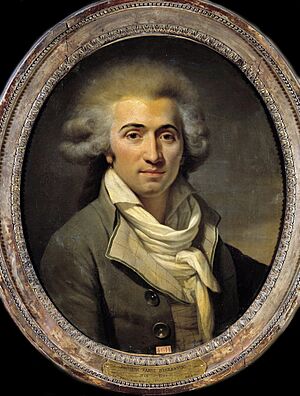Fabre d'Églantine facts for kids
Quick facts for kids
Fabre d'Églantine
|
|
|---|---|

Fabre d'Églantine
|
|
| Personal details | |
| Born | 28 July 1750 Carcassonne, Kingdom of France |
| Died | 5 April 1794 (aged 43) Paris, French Republic |
| Cause of death | Execution by guillotine |
| Political party | Jacobin |
Philippe François Nazaire Fabre d'Églantine (born July 28, 1750 – died April 5, 1794) was a French actor, writer, and politician during the French Revolution. He is often known simply as Fabre d'Églantine.
He is most famous for creating the names of the months in the French Republican calendar. He also wrote the popular song "Il pleut, il pleut, bergère", which is still a well-known children's rhyme today.
Contents
Fabre's Early Life and Plays
Fabre d'Églantine was born in Carcassonne, France. His original last name was Fabre. He added "d'Églantine" to his name after winning a silver wild rose (églantine in French) at a poetry contest in Toulouse.
In 1778, he married Marie Strasbourg Nicole Godin. One of his first works was a poem called Étude de la nature (The Study of Nature) in 1783. He traveled around France as an actor before moving to Paris. There, he wrote a comedy called Les Gens de lettres, ou Le provincial à Paris (1787), but it was not very successful.
Another play, a tragedy called Augusta, also failed. However, many of his later plays became popular, and he is seen as an important writer during the French Revolution. His most famous play was Philinte, ou La suite du Misanthrope (1790). This play was meant to be a follow-up to Molière's famous play Le Misanthrope.
Fabre d'Églantine believed that theater should help shape the new society of the French Revolution. He wanted plays to promote ideas like equality and brotherhood among people. He thought that theater could help create a better, more revolutionary society.
Fabre's Role in Politics
Fabre d'Églantine was an active politician during the French Revolution. He was a leader in the Cordeliers and Jacobin Clubs, which were important political groups. Georges Danton, a powerful revolutionary leader, chose Fabre as his personal secretary. Fabre also served in the National Convention from 1792 to 1794, which was the governing assembly of France.
He voted for the death of King Louis XVI of France. He also supported laws that allowed for quick legal decisions and was a strong opponent of the Girondins, another political group.
After the death of Jean-Paul Marat in 1793, Fabre published a tribute to him.
Creating the French Republican Calendar
One of Fabre d'Églantine's most notable contributions was his work on the French Republican Calendar. This new calendar was created when the traditional Gregorian Calendar was abolished in France. While the calendar was designed by Gilbert Romme, Fabre d'Églantine is famous for inventing the names of its months.
The new calendar had a ten-day week. This was done to make people forget Sunday as a religious day. The months were given names that described the seasons and nature. For example, he named months like Prairial (meaning meadow) and Floréal (meaning flowers). He also named the days Primidi and Duodi. Fabre explained that the goal was to replace old beliefs with reason and to celebrate farming and rural life.
Fabre's Final Days and Legacy
In late 1793, Fabre d'Églantine faced serious accusations of wrongdoing related to business deals. He was accused of being involved in a scheme to make money from the closing of the French East India Company.
On January 12, 1794, Fabre was arrested by order of the Committee of Public Safety. During his trial, he tried to defend himself by blaming others, but he was found guilty.
According to stories from that time, Fabre remained calm. As he was taken to the guillotine on April 5, 1794, he sang his famous song, "Il pleut, il pleut, bergère". He was put to death along with other Dantonists, a group of politicians associated with Georges Danton. On his way to the scaffold, he reportedly handed out his handwritten poems to the people watching.
A play he wrote, Les Précepteurs, was performed after his death in September 1794 and was very well received. His collected works were published in 1802.
Fabre in Fiction
- Fabre d'Églantine is an important character in Hilary Mantel's novel A Place of Greater Safety, which is about the French Revolution.
- He also appears as a character in Emma Orczy's book The Way of the Scarlet Pimpernel.
 | Valerie Thomas |
 | Frederick McKinley Jones |
 | George Edward Alcorn Jr. |
 | Thomas Mensah |

